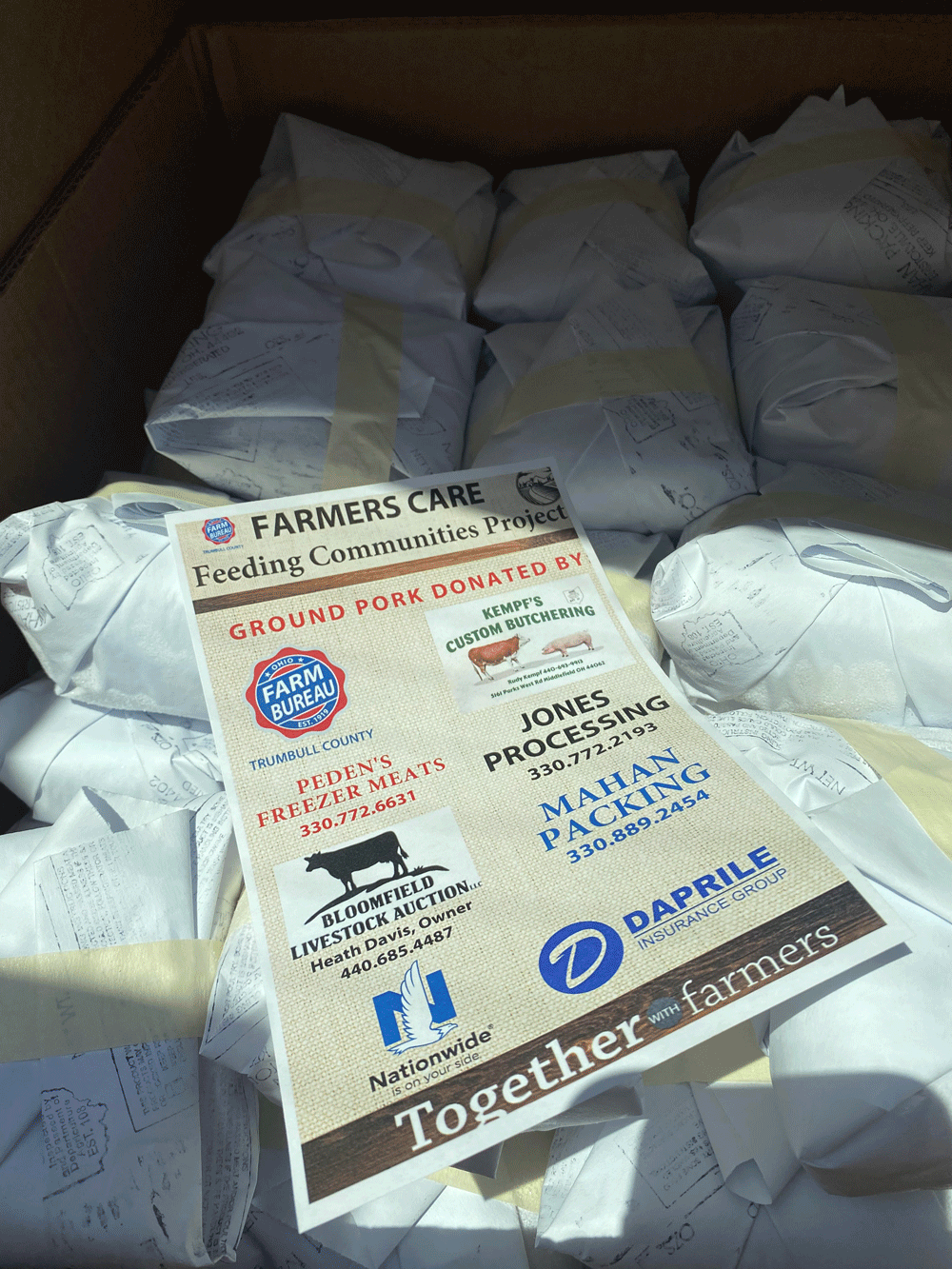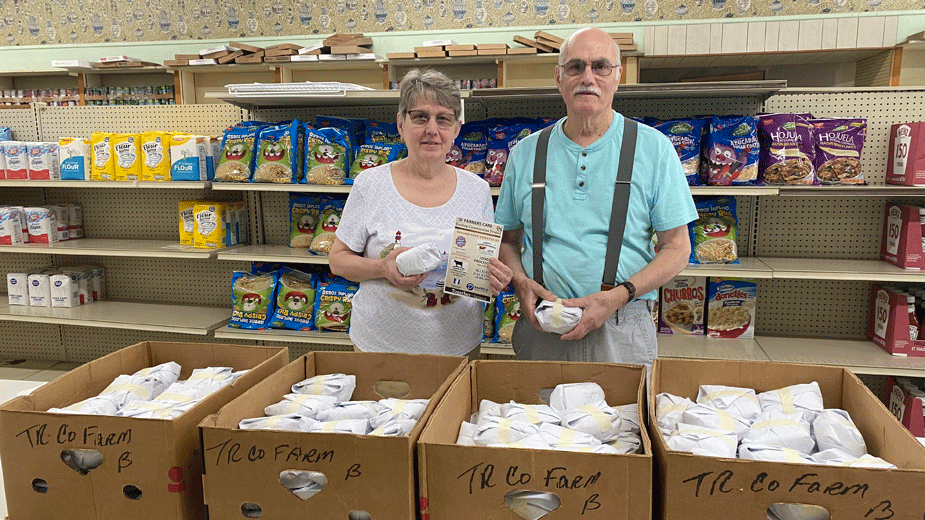Farm Bureaus Work to Get Meat to Food Banks
YOUNGSTOWN, Ohio – For many organizations, the coronavirus pandemic has brought a new set of challenges. Shoppers nationwide have seen dwindling stocks of meat on grocery store shelves. Food banks have seen demand greater than ever before. And many farmers have seen orders for the meat from their livestock canceled or delayed.
A new effort by local Ohio Farm Bureau districts is working to address all three. Through the Farmers Care-Feeding Communities initiative, the districts encompassing Mahoning, Trumbull and Columbiana counties – whose jurisdictions also include Lake, Stark, Ashtabula and Portage counties – are buying meat from farmers and donating it to area food banks.
“In some cases, some of the meat is from farms who may have had a contract that was canceled,” says Nick Kennedy, organization director for the Columbiana, Mahoning, Stark and Portage counties. “Others were bought from local producers just to get into the hands of local food banks. They’re seeing a shortage right now and we want to get them options for protein.”
Right now, he says, the farm bureau district is working on finding places to get beef, pork and chicken processed. In Portage County, the farm bureau was able to donate 2,400 pounds of ground beef and roast to the Center for Hope in Ravenna.
“Our goal is three beef, five pigs and about 50 40-pound boxes of chicken breast to donate to Second Harvest,” he says. “One of the downsides to large quantities of meat is that food banks can’t legally break them down into smaller quantities, so the breast we have to get individually packed.”
In Trumbull County, organization director Mandy Orhood says her district – also covering Lake and Ashtabula counties – was able to get three pigs processed. Two have been delivered to food distribution centers: one run out of LaBrae Local School District and another out of Kinsman Presbyterian Church.
“They’re thankful for the donations because as small food banks, that’s the only way they survive. Most of them have doubled, if not tripled, in the number of families they’re feeding because of kids being off school and parents being out of work,” she says. “They rely on Second Harvest Food Bank but because there are so many pantries that have needs, it can be hard to get what they need.”
Both farm bureaus are buying the meat with funds collected from member dues. The groups are also accepting donations. Support has also been provided by Daprile Insurance Group, which donated $1,000. The agency is a representative of Nationwide Insurance, which was founded in 1926 by the Ohio Farm Bureau.
“What the farm bureaus are essentially doing is trying to connect the supply chain dots so we can help feed local families without going through big box stores,” says agency owner Tony Daprile, a volunteer with the farm bureau. “There’s a local farmer in Columbiana County that has 30 hogs whose order got canceled by the processor. We, in turn, are buying those hogs and paying to have them processed and packaged and distributed to food banks.”
The issue the bureaus have run into, however, is that local processors have a full schedule. As large processing plants shut down due to outbreaks of the coronavirus, holes started apeparing in the supply chain, the district directors say.
“That’s backed up the system all the way down to smaller meat markets because you have people trying to sell their meat,” Kennedy says. “There’s a want and need for it. There’s not a shortage, but the processing is the biggest problem.”

Orhood’s district has only processed the three pigs, she explains, because it was all that could be fit into the schedules at the three Trumbull County meat processors, all of whom are farm bureau members; one pig was sent to each. Two of the processors donated the processing fee, while the third donated also donated the kill fee.
“Right now, we have accessibility to hogs and cattle, but we can’t get them processed until next year,” she says. “I’m sure they’d attempt to squeeze us in if we do more hogs, but right now we want to try and do ground beef, which is harder to get in because it’s more work.”
For the farmers themselves, Kennedy and Orhood say those raising livestock have been happy to help the food banks despite taking a hit from the coronavirus.
“Even though they’re getting hit hard by the economy right now, they’re still wanting to help. We have a couple that are willing to sell to us at a discount because they know what it’s going to be used for and they want to help their community,” Kennedy says.
While local farms haven’t been hit particularly hard yet, if the pandemic continues long enough, they will be, he continues. To help them weather the storm, the bureau has been encouraging members to offer online sales if they didn’t already. The district also set up a Facebook page, Mahoning County Farm Market-Buy Local, to allow farmers to post about what they have in stock.
“Do I expect to see a lot of farms shutter their doors? No, I don’t. But I see there’s going to be harder times for these folks through all of this,” he says. “We want to continue to help them sell direct to consumers – which not every farm does – and make more connections.”
While the short-term goal of the farm bureaus and their members is to ensure farms stay afloat and that local food banks have the meat they need, there can be long-term benefits of the Feeding Communities initiative.
“This should be more of an eye-opener about where their food comes from, not just meat but also corn, soybeans, barley, whatever is grown,” Daprile says. “These animals aren’t fed chemicals. They’re organically grown. They aren’t fed steroids to beef them up. This trend, I hope, resonates with people.”
As more people than ever look to buy products locally, Orhood notes that buying from local farmers doesn’t necessarily have to mean buying directly from them.
“We always want to push buying local, but a lot of people don’t know where to buy it, so that’s been one of our big pushe,” she says. “On the other side, we have a family farm who supplies Giant Eagle and Kroger. Yes, it’s important to buy local, but it takes those farmers to supply grocery stores too. No matter what, you are supporting farmers.”
Pictured: Volunteers at Kinsman Presbyterian Church worked to distribute the pork donated by the Trumbull County Farm Bureau. The bureau has also donated pork to the LaBrae Local School District food distribution center.
Copyright 2024 The Business Journal, Youngstown, Ohio.



